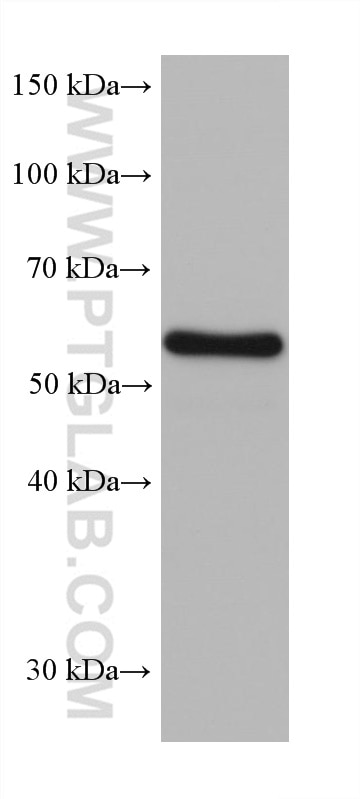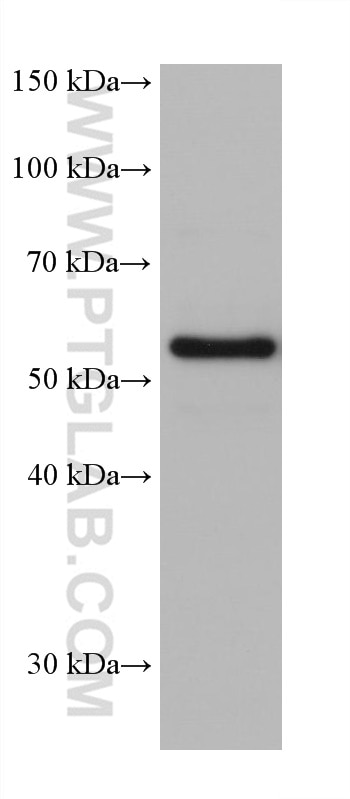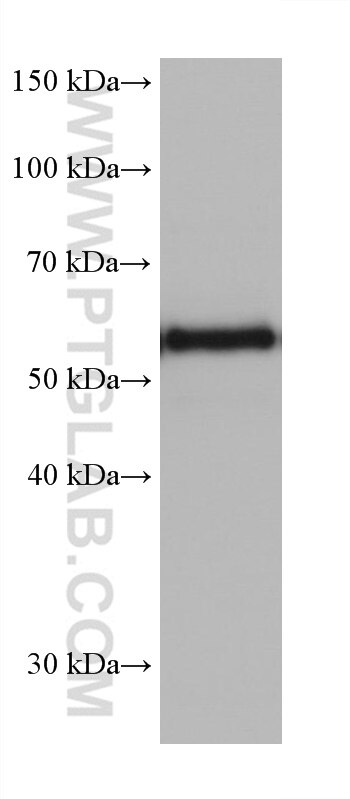Tested Applications
| Positive WB detected in | pig brain tissue, rabbit cerebellum tissue, rat cerebellum tissue |
Recommended dilution
| Application | Dilution |
|---|---|
| Western Blot (WB) | WB : 1:5000-1:50000 |
| It is recommended that this reagent should be titrated in each testing system to obtain optimal results. | |
| Sample-dependent, Check data in validation data gallery. | |
Product Information
68272-1-Ig targets CRMP5 in WB, ELISA applications and shows reactivity with Human, Mouse, Rat, Pig, Rabbit samples.
| Tested Reactivity | Human, Mouse, Rat, Pig, Rabbit |
| Host / Isotype | Mouse / IgG2a |
| Class | Monoclonal |
| Type | Antibody |
| Immunogen |
CatNo: Ag0783 Product name: Recombinant human DPYSL5 protein Source: e coli.-derived, PGEX-4T Tag: GST Domain: 265-564 aa of BC002874 Sequence: KVVLAETTTAHATLTGLHYYHQDWSHAAAYVTVPPLRLDTNTSTYLMSLLANDTLNIVASDHRPFTTKQKAMGKEDFTKIPHGVSGVQDRMSVIWERGVVGGKMDENRFVAVTSSNAAKLLNLYPRKGRIIPGADADVVVWDPEATKTISASTQVQGGDFNLYENMRCHGVPLVTISRGRVVYENGVFMCAEGTGKFCPLRSFPDTVYKKLVQREKTLKVRGVDRTPYLGDVAVVVHPGKKEMGTPLADTPTRPVTRHGGMRDLHESSFSLSGSQIDDHVPKRASARILAPPGGRSSGIW Predict reactive species |
| Full Name | dihydropyrimidinase-like 5 |
| Calculated Molecular Weight | 61 kDa |
| Observed Molecular Weight | 61 kDa |
| GenBank Accession Number | BC002874 |
| Gene Symbol | CRMP5 |
| Gene ID (NCBI) | 56896 |
| RRID | AB_2935355 |
| Conjugate | Unconjugated |
| Form | Liquid |
| Purification Method | Protein A purification |
| UNIPROT ID | Q9BPU6 |
| Storage Buffer | PBS with 0.02% sodium azide and 50% glycerol, pH 7.3. |
| Storage Conditions | Store at -20°C. Stable for one year after shipment. Aliquoting is unnecessary for -20oC storage. 20ul sizes contain 0.1% BSA. |
Background Information
Collapsin response mediator proteins (CRMPs) are a family consisting of five homologous cytosolic phosphoproteins (CRMP1-5). All five CRMPs are abundantly expressed in the developing brain and the adult nervous system. CRMP5 is phylogenetically divergent from the other four CRMPs, sharing only 50% homology; this protein plays an important role in modulating filopodial dynamics and, in turn, restricting neuronal growth cone development.
Protocols
| Product Specific Protocols | |
|---|---|
| WB protocol for CRMP5 antibody 68272-1-Ig | Download protocol |
| Standard Protocols | |
|---|---|
| Click here to view our Standard Protocols |








